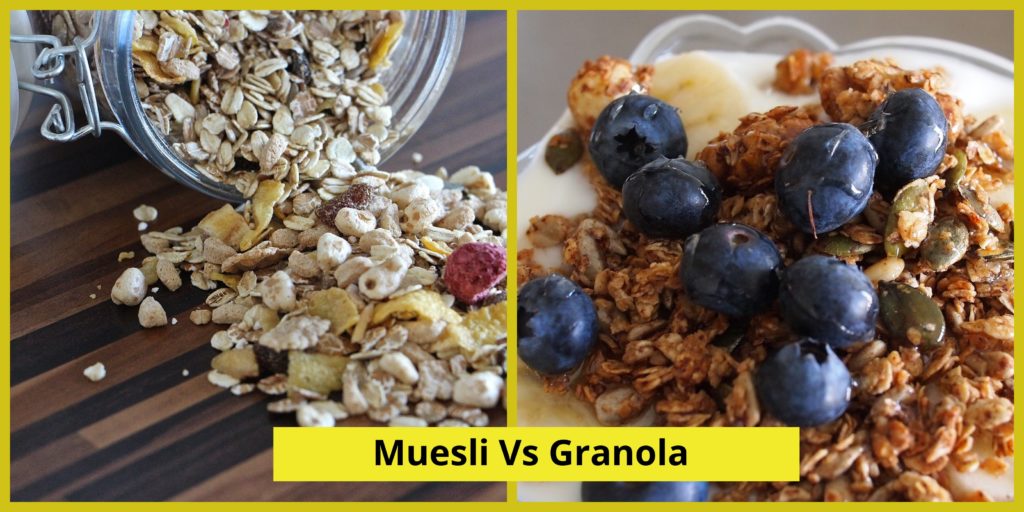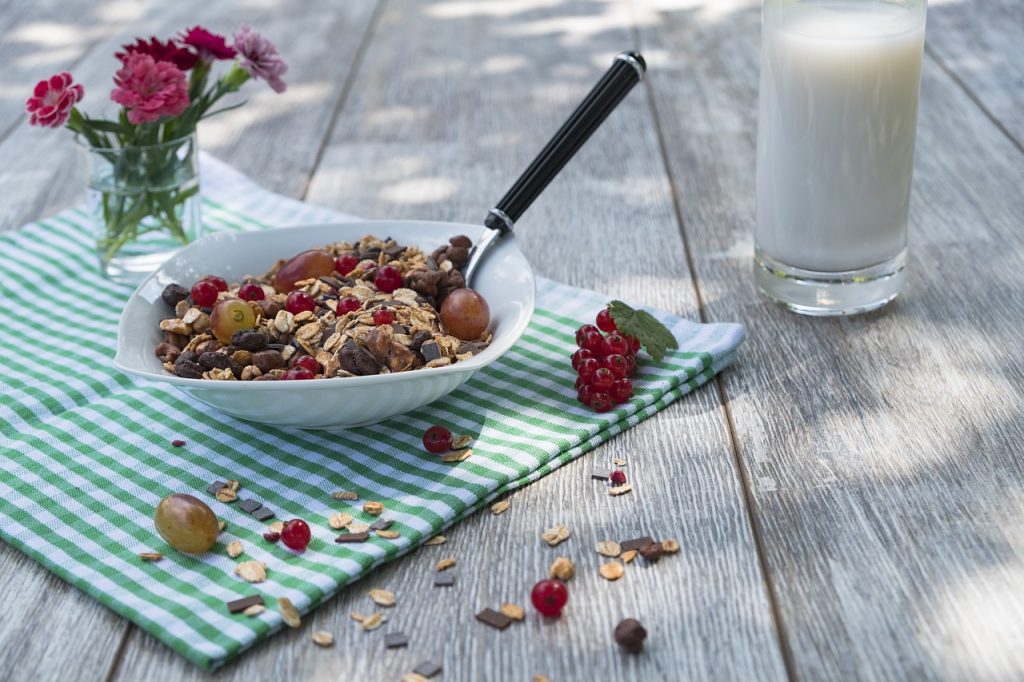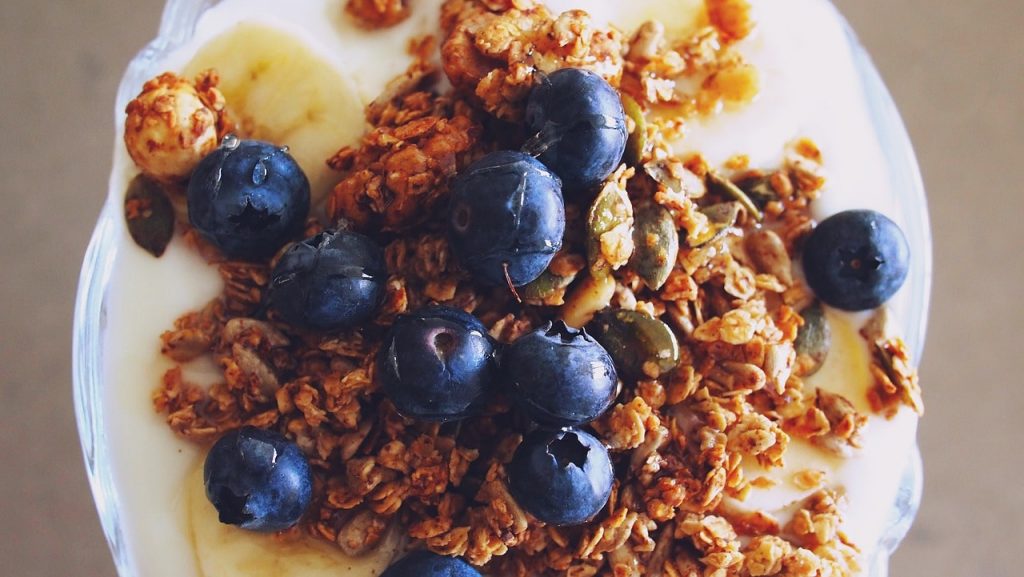Table of Contents
Muesli Vs Granola – What’s For Breakfast?
General Mills Cinnamon Toast Crunch, Cereal with Whole Grain, 12 Oz, 2 Pack

Granolas and muesli come in a variety of flavor options, and here’s the best part: you can even make them at home! But most people wonder about the difference between muesli and granola. Let’s face it, this has been a long debated query. Though the two might look similar and are also consumed in similar ways, the fact is that they both differ in the way they are prepared. This also leads to a difference in the nutritional content of muesli and granola.
When consumed in a healthy way, with lots of fruits, nuts and seeds, granola and muesli can both help add nutrition to your diet, aid in bodily functions such as digestion, and also help in the removal of excess water.
But, before we can discuss the difference between muesli and granola further, let us first take a look at both more closely.
What Is Muesli?

1. History Of Muesli
Muesli is a dish which was created in Europe in the early 20th century by a Swiss physician by the name of Maximilian Bircher-Benner. Back then, it was used as a dietary supplement for patients in Europe.
2. How Is Muesli Eaten?
Muesli is a type of breakfast cereal that is usually served with cold milk and is a mixture of oats (called जई in Hindi), dried fruits, nuts, and grains. It can also be eaten with hot milk like a porridge.
Animal based milk can also be replaced with plant-based milk like almond milk, soy milk and coconut milk. You can also soak them overnight in cold milk to make a porridge like consistency.
When you soak the muesli overnight in milk, the oats become a creamy consistency that tastes amazing. Add some chopped fruits on top for a satisfying meal.
If you like your muesli cold and good (soaked in a liquid) or if you are lactose intolerant, you can also change the liquid you soak your muesli in. A great alternative to milk is a fruit juice like orange juice or pineapple juice. You can also use plant-based milks. Muesli can also be cooked with milk and served hot like a porridge.
3. Benefits Of Muesli
Being rich in anti-oxidants, muesli helps to promote a healthy lifestyle. Also, the quantity of sugar present in muesli is typically less as compared to other breakfast cereals, makes it one of the healthier breakfast options. You can either add a chopped apple or a banana to increase the nutritional value of your breakfast.
Looking for recipes? You can easily make it at home by following this easy muesli recipe.
What Is Granola?

1. History Of Granola
Unlike Muesli, Granola was created in the late 19th century in New York by Dr James Caleb Jackson. Granola is a mixture of nuts, rolled oats, and sweeteners such as honey or brown sugar, which are baked until the oats turn crisp and change their colour to golden brown. The mixture is continuously stirred during the baking procedure so that it maintains its loose consistency.
2. How Is Granola Eaten?
Granola is enjoyed best as a breakfast cereal, served with cold milk and sometimes with yogurt. Granola can be served as it is too, it makes for a delicious snack. You can also make delicate looking granola bowls at home that are ‘instagrammable’. Add some fresh fruit on top. Granola is preferred cold, and mostly no one enjoys it with hot milk.
Looking for a ready-to-eat granola and yogurt option? You can read our review of Epigamia Snack pack – Mango Greek Yogurt with Chunky Granola to find more about the product.
3. Benefits Of Eating Granola
Since granola is a rich source of carbohydrates, it provides gymming enthusiasts and runners a boost of much-needed energy.
Related Reading: We review products over days, and sometimes weeks, so you can shop better. Read our Best Packaged Dahi To Buy Review here.
What Is The Difference Between Muesli And Granola?
- The major difference between muesli and granola is that while granola is baked using oil and sweeteners, muesli is essentially raw. However, both are mixtures of oats, and nuts and seeds.
- Granola is likely to have clusters or chunks of oats and nuts stuck together as a result of the baking process. Muesli tends to be much loose, and dry, in consistency.
- Granola is also known to have more calories as compared to muesli due to the addition of fat (oil / butter) and sweeteners. Having said that, it would important to note that the eventual calorie-count completely depends on the ingredients used.
- Some packaged mueslis may come loaded with added sugar and may have a higher calorie content as compared to a homemade granola.
- Read the nutrition labels well when buying either product off the shelf.
Muesli |
Granola |
| Not baked | Baked |
| No added sweetener | Sweetener added |
| Loose consistency | Granola has lumps or clusters |
| No oil | Contains oil |
| No binding agent required | Binding agent required |
| Low calories in comparison | Higher calories in comparison |
Also Read: Benefits Of Curd: 13 Natural Health And Beauty Benefits Of Curd/Dahi
The Bottom Line
The main takeaway, especially from the above listed differences between the two cereals, is that there is no particular way to find the best breakfast cereal among muesli and granola.
The presence of oil and additional sweeteners in granola, do give muesli a slight edge above granolas. Raw muesli helps by keeping you filled for a longer time. A morning bowl of muesli can prove to be an energizing and a more satisfying breakfast as compared to granola for those trying to cut calories and regulate sugar consumption.
No matter what, you can be assured that your breakfast will be a crunchy one! Which of these oat-based breakfast items is your favorite?
Frequently Asked Questions
Here are some FAQs about muesli and granolas.
1. Is muesli healthier than granola?
There has been a lot of speculation around this topic but to simply put the facts out there, both options are healthy. While both have the same core ingredients of rolled oats, nuts and seeds, granola contains added sweeteners like honey or jaggery, and oils to bind it together like coconut oil or olive oil. Muesli isn’t baked and does not contain added sugar and oil.
2. How do you sweeten muesli?
You can naturally sweeten your milk-muesli bowl with some fresh fruit like mangoes, banana or apples. If the need arises and you want to sweeten home made muesli, there are a number of ways –
1. Honey
2. Maple syrup
3. Jaggery
4. Desi khaand
5. Agave nectar
6. Sweet date pulp
7. Brown sugar
You can add a pinch of powdered cinnamon, toasted coconut flakes, raisins, and currants to increase the flavor and sweetness of muesli.
3. What makes granola stick together?
The sweeteners like honey, agave, maple syrup that are added to granola have natural binding abilities. Not only that, the oil added to the granola helps in the binding process, too. Coconut oil especially helps to bind the granola. Some even add egg whites, but you can skip that procedure if you are a vegetarian or just don’t like the taste of eggs.
4. Which grains can I add to muesli?
You can add any grains which you like taste wise. Some of the option are rolled oats, wheat bran, millets, barley, whole rye, sorghum flakes, and whole quinoa. Commonly, muesli consists of 4 parts of grains, 1 part nuts and seeds and 1 part dried fruits.
5. Which seeds can I add to muesli and granola?
Seeds are full of antioxidants and must be included in your diet. Muesli and granola are a tasty way of adding these seeds in your meals. You can add flaxseeds, chia seeds, sesame seeds, poppy seeds, and sunflower seeds. Make sure you use seeds in moderation, as overconsumption for a long period can lead to some side-effects.
6. Which dried fruits and dried berries can be added to muesli and granola?
Dried fruit and berries add a lot of flavor to an otherwise boring bowl of cereal. Muesli and granola need about 1/2 to 1 portion of dried fruits. Some of the dried fruits you can add to muesli or granola are – dried figs, raisins, currants, dried cranberries, dried apricots, dried strawberries, dried kiwi, and dried mango bits.
Disclaimer – This content including advice provides generic information only. It is in no way a substitute for qualified medical opinion. Always consult a specialist or your own doctor for more information before making any dietary changes.








